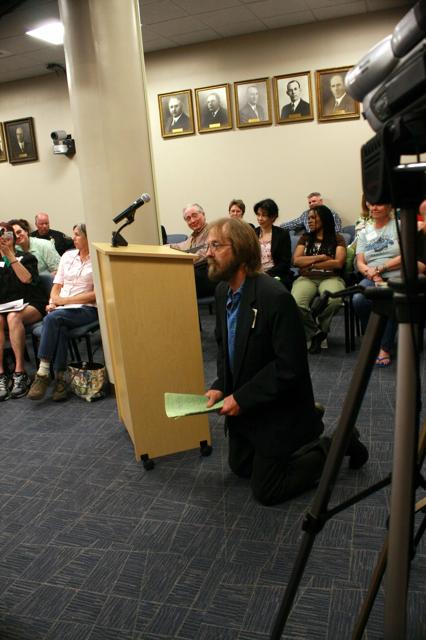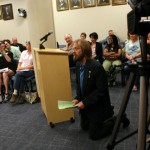- I want my URTV: Producer Jeff Turner kneeled and pleaded with commissioners to give the public access television station more funding. Photos by Jerry Nelson
Buncombe County Board of Commissioners April 19, 2011 meeting
- URTV threatens legal action
- Board allocates $1.2 million for conservation easements
The Buncombe County Board of Commissioners voted 3-1 on April 19 to allow asphalt plants in more areas. Previously permitted only in the more rural “open use” districts, they’ll now also be allowed in “employment” zoning districts, thanks to a change in the zoning ordinance. (Board Chair David Gantt cast the lone opposing vote; Vice Chair Bill Stanley was absent.)
The board also established safeguards aimed at minimizing the impact of the plants on surrounding areas. Proposed asphalt plants would have to "employ the most current, state-of-the-art methods, systems, techniques and production processes available in order to achieve the greatest feasible air- and odor-emissions reductions, including fugitive emissions and fugitive dust." In addition, they would need to: be located at least 2,640 feet from any medical facility, school or park; maintain "buffer strips" along the property lines; and have "sufficient access to a major highway so as to minimize truck travel through residential neighborhoods," among other requirements. All new plant construction will still have to be approved by the Board of Adjustment and the WNC Regional Air Quality Agency.
Those restrictions didn’t satisfy Gantt, however. "We're a healthy community, and I just don't think I can support adding the potential for more asphalt plants to Buncombe County," he said, pointing out that the ordinance doesn't specify any additional setback from residential areas and mandates only a 100-foot buffer between asphalt plants and private drinking-water wells.
Gantt also voiced a more general concern: "While I appreciate the [Planning Board's] efforts, I can't support it, because it seems like something we're doing for one individual. And I think that's always bad policy," he asserted.
Make me a pallet
Although it wasn't directly acknowledged during the meeting, the county began re-examining its asphalt-plant policy in response to a request by the WNC Pallet & Forest Products Co. to rezone land it owns on the Smoky Park Highway in Candler from “employment district” to “open use.” The request was denied, but the board instructed staff to reconsider the issues surrounding asphalt plants.
After about four months of study, both the Planning Board and county staff recommended the ordinance change, which could enable WNC Pallet to build an asphalt plant adjacent to its facility at 1414 Smoky Park Highway. The company is the largest forest-products supplier in Western North Carolina.
Commissioner Holly Jones hesitated before voting for the measure. "I was the one who encouraged this community conversation to see where asphalt plants can be built," she noted. "But I'm struggling with the process, because this is kind of a big deal."
After her call to delay the vote for "a couple of weeks to do a gut check" went unseconded, Jones ended up praising the measure's safeguards, pointing out that until now, there’d been no specific rules governing asphalt-plant construction in open-use districts.
"I am going to be supportive of this today," she told county planner Debbie Truempy, who presented the measure to the board. “A lot of concerns have been addressed in your standards.”
Five people spoke during the hearing; the only one who clearly favored the change was attorney Craig Justus, who represents WNC Pallet, though he didn't identify himself or his connection with the company during the hearing.
“The 100-foot [requirement] from a well is scary,” asserted Jeff Turner, who recently served on the county’s Soil & Water Conservation Board. "You've already got CTS; it sounds like this could be the makings of another one of those. Hazardous material shouldn't be that close to a well."
Justus countered that the ordinance had come out of "lots of meetings," observing, "Unanimous recommendation from the Planning Board is a miracle unto itself.
"The bottom line here is the Planning Board covers everything that could happen," he asserted. “The state of North Carolina has decided that 100 feet is sufficient. … The risk of flooding is very small."
Lights, camera, legal action?
During the meeting’s lengthy public-comment period, several producers and board members from The WNC Community Media Center pleaded with the commissioners to provide more funding for URTV, the county’s public-access channel, which the nonprofit manages.
The center announced April 1 that it would shut down April 30 unless additional funding was immediately forthcoming. After hearing from several URTV representatives and John Howell of Telecommunications Consulting Associates (who advises the county on media issues), however, the commissioners took no action at their April 5 meeting. The Media Center also threatened to shut down last year due to financial problems (see “Broke,” June 9, 2010 Xpress).
During the April 19 meeting, Bob Horn, who is vice president of the media center’s board, cast the present situation in dire terms, charging that the county is illegally withholding funds from the channel and threatening legal action.
Reading from a press release the nonprofit had distributed among the audience, Horn explained: "WNCCMC will not be closing its doors at this time as originally announced. The Board … is looking at legal and financial obligations and responsibilities of due process. Due to monies owed WNCCMC and the fiscal responsibility (culpability) by contract with Buncombe County Board of Commissioners, WNCCMC requests that bills and funds be paid."
Veering off the script, Horn added, "This commission is still in a position to release the PEG moneys already owed to WNCCMC/URTV to avoid legal action presently planned on the part of all aggrieved parties by agreement before the close of this session and delivered by 10 a.m. Wednesday [April 20]."
Horn explained later that "Basically, what we're doing is forcing the issue. … If we close, it will be like we gave up." He also noted that the center is considering sending its bills directly to the county.
Gantt instructed County Attorney Michael Frue to prepare a memo analyzing the legal issues involved and make it available to the public. "We want to make sure we're not missing anything," he said. "We're going to follow the law."
Conserving green space
In other business, the commissioners unanimously approved allocating more than $1.2 million in the 2012 budget (which begins July 1) to help fund conservation easements shielding some 1,634 acres of land throughout the county from development. The protected areas include 506 acres in Fairview’s Little Pisgah Mountain area and 235 acres in the Broad River area, the longtime home of the now defunct Camp Woodson.
The Land Conservation Advisory Board, the Agriculture Advisory Board for Farmland Preservation, and the Soil & Water Conservation District all endorsed the measure. The commissioners voiced enthusiastic support.
"I'm overwhelmed that we have the opportunity to preserve this much land," Gantt exclaimed. "We don't have these opportunities every day: They come and go fast. … We can't save it all, but what we choose to protect and save is good land."
— Jake Frankel can be reached at 251-1333, ext. 115, or at jfrankel@mountainx.com.






Commissioner Holly Jones and Craig Justus should be taken on Riverlink’s Brownfields tour near downtown Asheville to learn how many millions it takes to attempt to restore contaminated land… not to mention the human suffering over the years. How does it make sense to change the law from one exception that harms one neighborhood to blanket allowance of asphalt plants in every “employment” zone in Buncombe County?
The non-profit organization managing Buncombe’s public access station does not have a valid contract with the county. This fact has been recently revealed to the Board of URTV, but County Attorney Micheal Frue.
Seems the “expert” management neglected to apply for an extension or renewal of the contract. That contract expired Feb.1, 2010.
@JL — there are differing views on whether the contract is valid or not. Stay tuned.
Reading through the contract,looks like the County has many outs. The most glaring being the gross non-compliance by the management of numerous sections in the contract.
By simply enforcing Section3 pg.4 (Performance Review) would reveal many of the ongoing problematic issues.
Craig Justus’ argument that flooding is rare prompts me to suggest readers look at our recent story on the frequency of flooding in this community; see it online at:
http://www.mountainx.com/features/2011/033011green-scene-a-river-runs-through-it